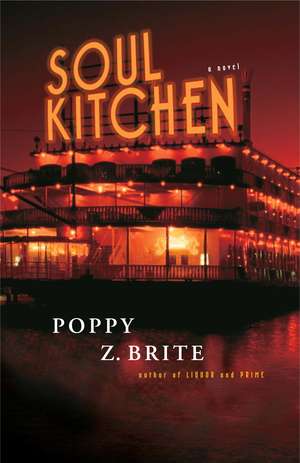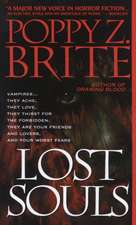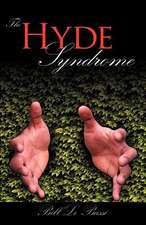Soul Kitchen
Autor Poppy Z. Briteen Limba Engleză Paperback – 30 iun 2006
Liquor has become one of the hottest restaurants in town, thanks in part to chefs Rickey and G-man’s wildly creative, booze-laced food. At the tail end of a busy Mardi Gras, Milford Goodman walks into their kitchen—he’s spent the last ten years in Angola Prison for murdering his boss, a wealthy New Orleans restaurateur, but has recently been exonerated on new evidence and released. Rickey remembers him as an ingenious chef and hires him on the spot.
When a pill-pushing doctor and a Carnival scion talk Rickey into consulting at the restaurant they’re opening in one of the city’s “floating casinos,” Rickey recommends Milford for the head chef position and stays on to supervise. But soon Rickey finds himself medicating a kitchen injury with the doctor’s wares, and G-man grows tired of holding down the fort at Liquor alone. As the new restaurant moves toward its opening, Rickey learns that Milford’s past is inextricably linked with one of the project’s backers, a man whose intentions begin to seem more and more sinister.
Full of the flavor of one of America’s greatest cities, Soul Kitchen is a sharp commentary on race relations in pre-Katrina New Orleans and a fast ride through the dark side of haute cuisine.
Preț: 106.04 lei
Nou
Puncte Express: 159
Preț estimativ în valută:
20.29€ • 21.11$ • 16.75£
20.29€ • 21.11$ • 16.75£
Carte disponibilă
Livrare economică 24 martie-07 aprilie
Preluare comenzi: 021 569.72.76
Specificații
ISBN-13: 9780307237651
ISBN-10: 0307237656
Pagini: 276
Dimensiuni: 142 x 203 x 15 mm
Greutate: 0.22 kg
Editura: Three Rivers Press (CA)
ISBN-10: 0307237656
Pagini: 276
Dimensiuni: 142 x 203 x 15 mm
Greutate: 0.22 kg
Editura: Three Rivers Press (CA)
Recenzii
“A high-end restaurant is—for any competent novelist—a gift that keeps on giving. The heat, the bickerings and intrigue, the pursuit of perfection, the dodgy money keeping it all afloat: the setting spawns plots . . . Can the [Liquor] franchise sustain itself? The answer is yes.” —New York Times
Praise for Liquor and Prime:
“Steeped in spicy dialogue and [New Orleans] flavor . . . a behind-the-swinging-door peek into the world of chefs.” —Entertainment Weekly
Praise for Liquor and Prime:
“Steeped in spicy dialogue and [New Orleans] flavor . . . a behind-the-swinging-door peek into the world of chefs.” —Entertainment Weekly
Notă biografică
Poppy Z. Brite is the author of two previous books in this series, Liquor and Prime, as well as five other novels and three short story collections. She lives in New Orleans with her husband, Chris, a chef.
Extras
1
Mardi Gras morning dawned dank and cold. The four cooks had already been at the restaurant for a couple of hours, preparing a krewe breakfast for Rickey's mother's truck parade.
Truck parades are a Carnival Day phenomenon unknown outside New Orleans. Rather than the ornate and glamorous confections boasted by the bigger, richer krewes, their floats are basically giant wooden boxes pulled by tractor-trailer cabs that blast their air horns incessantly as they roll through the streets. Each float's riders select a theme--Louisiana Sports Legends, say, or Favorite Desserts--and decorate their trailer in foil and crepe paper to reflect it. If they are feeling flush, they might invest in theme sweatshirts too, but many of the beads, cups, and trinkets they throw are caught from other parades earlier in the season or even the previous Mardi Gras. Truck parades are a part of blue-collar Carnival seldom seen by the tourists who frequent Bourbon Street, but a certain segment of the citizenry cherishes them.
John Rickey and Gary "G-man" Stubbs were not a part of that segment, at least not today. Because they owned a popular restaurant, Rickey's mother had convinced them to put on a breakfast buffet for the Krewe of Chalmatians, so named because most of its members were from New Orleans' Lower Ninth Ward or the neighboring suburb of Chalmette. Rickey and G-man had grown up in the Lower Ninth Ward, but moved away when they turned eighteen, a little over a decade ago. The only vestiges of downtown that remained were their gritty Brooklynesque accents and a certain reluctance to take any shit off of anyone, be it a lazy line cook, a purveyor delivering inferior produce, or a diner with an unjustified complaint about his meal.
Having cooked together for fifteen years and lived together for the better part of that time, Rickey and G-man knew each other's kitchen habits by heart and worked together as efficiently as two hands washing one another. To fill out their crew this morning they had recruited Tanker, their dessert guy who was secretly a crackerjack saute cook, and Marquis, who was young but learning fast. He'd started out as a salad bitch, but now they let him work the hot line on slow nights. Today he would be in charge of keeping bacon, sausage, and toast coming out of the oven, topping up the water in the rented steam tables, and cutting celery for the Bloody Marys.
Tanker had reheated the big pot of crawfish etouffee they'd made last night and was now working on a giant batch of grits. G-man, Rickey's co-chef and the true workhorse of the kitchen, was adding clarified butter to egg yolks in a double boiler to make hollandaise sauce for Rickey's eggs Sardou. Tall and rangy, with short dark hair tucked under a purple New Orleans Hornets baseball cap, G-man scowled at the sauce through the dark glasses he habitually wore in any bright light. He had tried to talk Rickey out of this fussy and time-consuming dish, but Rickey had insisted on it. The restaurant's name, Rickey pointed out, was Liquor. All their dishes contained some form of booze, a perfect concept for New Orleans. Of course they weren't sticking to the gimmick for this breakfast, but Rickey felt that at least one dish should pack an alcoholic punch, so eggs Sardou it was: poached eggs with artichoke hearts, hollandaise, and an Herbsaint-laced spinach cream.
"Splooge," Rickey muttered as he tasted the spinach. Not as tall as G-man and a little paunchy from a lifetime of sampling his own dishes, he was handsome enough to have been anointed a glamour boy by the national food press, but his features were sharpened by a nervous tension that seldom left him even when he was drunk or sleeping. "Baby food. All this fucking shit is baby food. It's giving me flashbacks to when I had to work hotel brunch."
"So why'd you sign up?" said Tanker. "More to the point, why'd you sign us up? Nobody said you had to make breakfast for three hundred."
"It's not three hundred. I mean, they got like three hundred people in the krewe, but not all of them are gonna show up."
"You hope," G-man said.
"My mom made a signup sheet, OK? We got one-eighty coming in. We scoop it and poop it, they eat it, everybody's happy."
"Yeah, but why'd you agree to it in the first place?" Tanker persisted. "I mean, you're a prima donna, Rickey. You hate this kinda shit."
"I know it." Rickey pushed the blue bandanna up on his forehead and thumbed a stray drop of sweat out of his left eye. "But it's my mom, dude. She never asks me for anything."
"Except a couple grandbabies," G-man said. Rickey's mother had been doing her best to ignore G-man's role in her son's life for years now.
"Yeah, well, you know she's never getting 'em, so I figured we could do this for her. Besides, these clowns are paying pretty good."
"I think my momma wishes she'd quit getting grandbabies," said Marquis. "My sister, she just done had her fifth."
"Jesus."
"And the daddy don't help her out nohow."
"Same one for all five kids?" Tanker asked.
Marquis glanced up at him, seemed to measure whether such a fatuous white-boy question deserved any response at all, said, "Nah, dawg," and went back to laying out strips of bacon on a sheet pan.
G-man, the youngest of six children from an Irish-Italian family, silently counted himself lucky that his parents already had an even dozen grandchildren. Otherwise, his mother probably would have been pushing him and Rickey to get a kid from somewhere or other despite her strict Catholic beliefs. Of course, owning a restaurant was a lot like having a five-hundred-pound baby that never grew up. Originally financed by local celebrity chef, multimillionaire, and all-around shady businessman Lenny Duveteaux, Liquor was running under its own steam now, and they hoped to buy Lenny out with some money Rickey had inherited under strange circumstances the year before. Most of the inheritance was tied up in a piece of Texas property, however, and Lenny still owned twenty-five percent of Liquor. Fortunately, he was busy with his own two successful restaurants and mostly left Liquor alone.
Rickey put the spinach cream in the lowboy refrigerator at his station and headed back to the walk-in cooler to get a case of eggs. The other cooks had begged him to use a powdered mix for the scrambled eggs--it would have made his life far easier this morning, and if Rickey's life was easier, theirs were too--but such a shortcut simply wasn't in his nature. He might be a bit of a whore, he supposed, but he was no shoemaker. He would scramble the eggs slowly and gently in a double boiler, adding a knob of butter now and then, until they took on the perfect creaminess that was the only acceptable consistency for scrambled eggs as far as he was concerned. If the Chalmatians just shoveled the eggs into their hungry maws, too drunk to notice the difference, he would still have the satisfaction of knowing he had done them right. That satisfaction was one of the major things he lived for.
In the three years since it opened, Liquor had become not just a popular restaurant but a trendy one. Between Lenny's machinations, food-press enthusiasm, a prestigious James Beard award, and a couple of healthy doses of controversy, it was now one of the best-known new restaurants in New Orleans. (In a city where several eateries had been in business for a century or more, it would remain a "new restaurant" for at least a dozen more years.) Rickey had very mixed feelings about this trendiness. Because of it, and because of what Food & Wine had once cringe-inducingly called "his dissipated-fratboy good looks," he had been subjected to all manner of hype that had nothing to do with the backbreaking day-to-day business of running a world-class kitchen.
Agreeing to do this breakfast had been one of his little ways of reacting against the hype. Most hot chefs would probably turn up their coke-encrusted noses at the idea of cooking splooge for a hundred and eighty working-class yats. Rickey still considered himself one of those yats, and while he wasn't exactly proud of the food itself, he liked how aggressively declasse such a breakfast was.
Lost in his thoughts, he nearly tripped over some large object that had been left on the floor of the walk-in. Peering down in the dim light, he saw that it was a burlap sack of oysters. At the krewe's request, they'd set up a makeshift oyster bar in the dining room for those perverts who considered a dozen icy-cold raw mollusks dipped in ketchup, horseradish, and Tabasco part of a nutritious breakfast. (Rickey liked oysters on the half shell just fine, but not at seven o'clock in the morning.) Marquis was supposed to have lugged the oysters up front and dumped them on ice to await the shucker's arrival, but apparently he had forgotten.
Rickey started to holler for him, then decided not to. Marquis was getting to be a decent cook, but he was easily distracted. If he left his station now, he'd probably burn the bacon or worse. Instead Rickey bent to hoist the fifty-pound sack onto his shoulder. As soon as it came off the floor, he knew he'd lifted it badly, and an instant later he felt something give deep in the small of his back.
"Owwwwwwfuck!" he yelled. His hands instinctively wanted to go to the injury, but he knew if he dropped the oyster sack now, he wouldn't be able to lift it again. Instead he got it the rest of the way up and stood holding his breath, waiting to see how bad the pain was going to get. It flared, twisted through his spine like a hot wire, then settled down with the air of a visitor that had found a comfortable spot and was planning to stay a while.
While Liquor was something of a trendy restaurant, its dining-room decor had little in common with that of most hot spots: no dangerous-looking metal sculptures, lipstick-red walls, glass floors with saltwater lagoons underneath, giant paintings of fruits and vegetables, or Arabian fantasies. Rickey, who micromanaged every aspect of the restaurant, had been far more influenced by the look of New Orleans' old-line joints, and so the dining room was a dark green, softly lit, clubby space accented with rich wood trim and small mirrors.
On a typical night, the dining room was full of men in suits or sports shirts, women in cocktail dresses, the clink of cutlery on plates and ice cubes in glasses, the aromas of fine food and fresh bread. This morning, it was packed with people in pink sweatshirts bearing the legend krewe of chalmatians and the krewe's logo, a spotted cartoon dog with a bouffant hairdo. The dog was supposed to be a Dalmatian, a pun on the krewe's name, but looked rather more like a Chihuahua with chickenpox. Most of the women had hairdos that rivaled the dog's. Most of the men were balding. At 6:45 a.m., the krewe members were already well-lubricated, happy, and yakking up a storm.
"Raymond! Hey, Raymond! I hope you don't getcha hand stuck in there again--"
"Aw, Marie, hush up about dat."
"How you makin, dawl? I ain't seen you since Friday, maybe Saddy--"
"Bud-DY! Where y'at?"
"We gotta good team! Dis is gonna be da year!"
At the bar, Mo--Tanker's girlfriend and Liquor's head mixologist--dispensed mimosas and poured Bloody Marys and screwdrivers from huge pitchers she had mixed early that morning. The waiters circulated, clearing dirty plates and topping up the buffet. The shucker, who had finally received the contents of the fateful burlap sack, slid his short flat blade between shells, severed connective muscles, nestled oysters by the dozen into platters of crushed ice.
At the center of the hubbub was Rickey's mother, Brenda Crabtree (she had retaken her maiden name upon her divorce a quarter-century ago), resplendent in a fresh Copper Penny dye job and cat's-eye glasses with a dusting of tiny rhinestones at the corners. At her side was her gentleman friend, Mr. Claude, listening meekly as was his habit in life. "This is my son's place!" she told anyone who would listen. "My boy, he's a famous chef! He got him a write-up in Bone Ape Tit Magazine!"
Back in the kitchen, the famous chef winced as he bent to retrieve more eggs. A small hiss of pain escaped him. G-man, who was now cooking French toast, heard it even over the sizzle and bang of the kitchen. "Dude, what's wrong with you?" he called. "You been gimping around all morning."
"Nothing," Rickey said. "Just twisted my back a little. I'm fine."
In fact, the pain had increased so much that he felt a little nauseated. He wasn't about to say anything, though. He might tell G-man what had happened later, after the shift was over, but cooks in the kitchen didn't cry about their injuries. Burned yourself? Consider the weal a badge of honor, like the tattoos most of them had. Sliced your finger open? Slap on a bandage or some duct tape, maybe Superglue it if it's really bad, and get back to work. Most of them had cut off at least one fingertip during the course of their careers, and all had ladders of burn scars on their forearms, hot-fat spatters on the backs of their hands, and feet that looked as if somebody had worked them over with a hammer. It was a painful line of work, but in the hyper-macho pirate crew atmosphere of the typical restaurant kitchen, complainers were apt to be mocked without mercy or hounded right out of a job.
G-man looked searchingly at Rickey over the tops of his shades, but said nothing; to challenge Rickey on this point in front of their crew would seriously violate the rough etiquette of the line.
"Anyway," said Rickey, "we only got a couple more hours. The Chalmatians gotta stage way the hell down on St. Claude, so they'll all be out of here by eight-thirty. We can break it down and get gone by nine."
"Y'all gonna watch the parade?" said Tanker.
"Aw, I don't know. My mom wants us to," (G-man rolled his eyes at that us) "but there's gonna be all that Zulu traffic."
"Just go on down Broad Street," said Marquis. "You can cut over to St. Claude after Jackson. Zulu don't go no farther than that."
"I know, I know. I been getting from Uptown to the Lower Ninth Ward all these years, I guess I can do it on Fat Tuesday. But it's gonna be a huge clusterfuck, and there'll be no place to park, and--"
"And waa, waa, waa," the other three cooks and the dishwasher chorused. Rickey frowned, then grinned reluctantly.
Mardi Gras morning dawned dank and cold. The four cooks had already been at the restaurant for a couple of hours, preparing a krewe breakfast for Rickey's mother's truck parade.
Truck parades are a Carnival Day phenomenon unknown outside New Orleans. Rather than the ornate and glamorous confections boasted by the bigger, richer krewes, their floats are basically giant wooden boxes pulled by tractor-trailer cabs that blast their air horns incessantly as they roll through the streets. Each float's riders select a theme--Louisiana Sports Legends, say, or Favorite Desserts--and decorate their trailer in foil and crepe paper to reflect it. If they are feeling flush, they might invest in theme sweatshirts too, but many of the beads, cups, and trinkets they throw are caught from other parades earlier in the season or even the previous Mardi Gras. Truck parades are a part of blue-collar Carnival seldom seen by the tourists who frequent Bourbon Street, but a certain segment of the citizenry cherishes them.
John Rickey and Gary "G-man" Stubbs were not a part of that segment, at least not today. Because they owned a popular restaurant, Rickey's mother had convinced them to put on a breakfast buffet for the Krewe of Chalmatians, so named because most of its members were from New Orleans' Lower Ninth Ward or the neighboring suburb of Chalmette. Rickey and G-man had grown up in the Lower Ninth Ward, but moved away when they turned eighteen, a little over a decade ago. The only vestiges of downtown that remained were their gritty Brooklynesque accents and a certain reluctance to take any shit off of anyone, be it a lazy line cook, a purveyor delivering inferior produce, or a diner with an unjustified complaint about his meal.
Having cooked together for fifteen years and lived together for the better part of that time, Rickey and G-man knew each other's kitchen habits by heart and worked together as efficiently as two hands washing one another. To fill out their crew this morning they had recruited Tanker, their dessert guy who was secretly a crackerjack saute cook, and Marquis, who was young but learning fast. He'd started out as a salad bitch, but now they let him work the hot line on slow nights. Today he would be in charge of keeping bacon, sausage, and toast coming out of the oven, topping up the water in the rented steam tables, and cutting celery for the Bloody Marys.
Tanker had reheated the big pot of crawfish etouffee they'd made last night and was now working on a giant batch of grits. G-man, Rickey's co-chef and the true workhorse of the kitchen, was adding clarified butter to egg yolks in a double boiler to make hollandaise sauce for Rickey's eggs Sardou. Tall and rangy, with short dark hair tucked under a purple New Orleans Hornets baseball cap, G-man scowled at the sauce through the dark glasses he habitually wore in any bright light. He had tried to talk Rickey out of this fussy and time-consuming dish, but Rickey had insisted on it. The restaurant's name, Rickey pointed out, was Liquor. All their dishes contained some form of booze, a perfect concept for New Orleans. Of course they weren't sticking to the gimmick for this breakfast, but Rickey felt that at least one dish should pack an alcoholic punch, so eggs Sardou it was: poached eggs with artichoke hearts, hollandaise, and an Herbsaint-laced spinach cream.
"Splooge," Rickey muttered as he tasted the spinach. Not as tall as G-man and a little paunchy from a lifetime of sampling his own dishes, he was handsome enough to have been anointed a glamour boy by the national food press, but his features were sharpened by a nervous tension that seldom left him even when he was drunk or sleeping. "Baby food. All this fucking shit is baby food. It's giving me flashbacks to when I had to work hotel brunch."
"So why'd you sign up?" said Tanker. "More to the point, why'd you sign us up? Nobody said you had to make breakfast for three hundred."
"It's not three hundred. I mean, they got like three hundred people in the krewe, but not all of them are gonna show up."
"You hope," G-man said.
"My mom made a signup sheet, OK? We got one-eighty coming in. We scoop it and poop it, they eat it, everybody's happy."
"Yeah, but why'd you agree to it in the first place?" Tanker persisted. "I mean, you're a prima donna, Rickey. You hate this kinda shit."
"I know it." Rickey pushed the blue bandanna up on his forehead and thumbed a stray drop of sweat out of his left eye. "But it's my mom, dude. She never asks me for anything."
"Except a couple grandbabies," G-man said. Rickey's mother had been doing her best to ignore G-man's role in her son's life for years now.
"Yeah, well, you know she's never getting 'em, so I figured we could do this for her. Besides, these clowns are paying pretty good."
"I think my momma wishes she'd quit getting grandbabies," said Marquis. "My sister, she just done had her fifth."
"Jesus."
"And the daddy don't help her out nohow."
"Same one for all five kids?" Tanker asked.
Marquis glanced up at him, seemed to measure whether such a fatuous white-boy question deserved any response at all, said, "Nah, dawg," and went back to laying out strips of bacon on a sheet pan.
G-man, the youngest of six children from an Irish-Italian family, silently counted himself lucky that his parents already had an even dozen grandchildren. Otherwise, his mother probably would have been pushing him and Rickey to get a kid from somewhere or other despite her strict Catholic beliefs. Of course, owning a restaurant was a lot like having a five-hundred-pound baby that never grew up. Originally financed by local celebrity chef, multimillionaire, and all-around shady businessman Lenny Duveteaux, Liquor was running under its own steam now, and they hoped to buy Lenny out with some money Rickey had inherited under strange circumstances the year before. Most of the inheritance was tied up in a piece of Texas property, however, and Lenny still owned twenty-five percent of Liquor. Fortunately, he was busy with his own two successful restaurants and mostly left Liquor alone.
Rickey put the spinach cream in the lowboy refrigerator at his station and headed back to the walk-in cooler to get a case of eggs. The other cooks had begged him to use a powdered mix for the scrambled eggs--it would have made his life far easier this morning, and if Rickey's life was easier, theirs were too--but such a shortcut simply wasn't in his nature. He might be a bit of a whore, he supposed, but he was no shoemaker. He would scramble the eggs slowly and gently in a double boiler, adding a knob of butter now and then, until they took on the perfect creaminess that was the only acceptable consistency for scrambled eggs as far as he was concerned. If the Chalmatians just shoveled the eggs into their hungry maws, too drunk to notice the difference, he would still have the satisfaction of knowing he had done them right. That satisfaction was one of the major things he lived for.
In the three years since it opened, Liquor had become not just a popular restaurant but a trendy one. Between Lenny's machinations, food-press enthusiasm, a prestigious James Beard award, and a couple of healthy doses of controversy, it was now one of the best-known new restaurants in New Orleans. (In a city where several eateries had been in business for a century or more, it would remain a "new restaurant" for at least a dozen more years.) Rickey had very mixed feelings about this trendiness. Because of it, and because of what Food & Wine had once cringe-inducingly called "his dissipated-fratboy good looks," he had been subjected to all manner of hype that had nothing to do with the backbreaking day-to-day business of running a world-class kitchen.
Agreeing to do this breakfast had been one of his little ways of reacting against the hype. Most hot chefs would probably turn up their coke-encrusted noses at the idea of cooking splooge for a hundred and eighty working-class yats. Rickey still considered himself one of those yats, and while he wasn't exactly proud of the food itself, he liked how aggressively declasse such a breakfast was.
Lost in his thoughts, he nearly tripped over some large object that had been left on the floor of the walk-in. Peering down in the dim light, he saw that it was a burlap sack of oysters. At the krewe's request, they'd set up a makeshift oyster bar in the dining room for those perverts who considered a dozen icy-cold raw mollusks dipped in ketchup, horseradish, and Tabasco part of a nutritious breakfast. (Rickey liked oysters on the half shell just fine, but not at seven o'clock in the morning.) Marquis was supposed to have lugged the oysters up front and dumped them on ice to await the shucker's arrival, but apparently he had forgotten.
Rickey started to holler for him, then decided not to. Marquis was getting to be a decent cook, but he was easily distracted. If he left his station now, he'd probably burn the bacon or worse. Instead Rickey bent to hoist the fifty-pound sack onto his shoulder. As soon as it came off the floor, he knew he'd lifted it badly, and an instant later he felt something give deep in the small of his back.
"Owwwwwwfuck!" he yelled. His hands instinctively wanted to go to the injury, but he knew if he dropped the oyster sack now, he wouldn't be able to lift it again. Instead he got it the rest of the way up and stood holding his breath, waiting to see how bad the pain was going to get. It flared, twisted through his spine like a hot wire, then settled down with the air of a visitor that had found a comfortable spot and was planning to stay a while.
While Liquor was something of a trendy restaurant, its dining-room decor had little in common with that of most hot spots: no dangerous-looking metal sculptures, lipstick-red walls, glass floors with saltwater lagoons underneath, giant paintings of fruits and vegetables, or Arabian fantasies. Rickey, who micromanaged every aspect of the restaurant, had been far more influenced by the look of New Orleans' old-line joints, and so the dining room was a dark green, softly lit, clubby space accented with rich wood trim and small mirrors.
On a typical night, the dining room was full of men in suits or sports shirts, women in cocktail dresses, the clink of cutlery on plates and ice cubes in glasses, the aromas of fine food and fresh bread. This morning, it was packed with people in pink sweatshirts bearing the legend krewe of chalmatians and the krewe's logo, a spotted cartoon dog with a bouffant hairdo. The dog was supposed to be a Dalmatian, a pun on the krewe's name, but looked rather more like a Chihuahua with chickenpox. Most of the women had hairdos that rivaled the dog's. Most of the men were balding. At 6:45 a.m., the krewe members were already well-lubricated, happy, and yakking up a storm.
"Raymond! Hey, Raymond! I hope you don't getcha hand stuck in there again--"
"Aw, Marie, hush up about dat."
"How you makin, dawl? I ain't seen you since Friday, maybe Saddy--"
"Bud-DY! Where y'at?"
"We gotta good team! Dis is gonna be da year!"
At the bar, Mo--Tanker's girlfriend and Liquor's head mixologist--dispensed mimosas and poured Bloody Marys and screwdrivers from huge pitchers she had mixed early that morning. The waiters circulated, clearing dirty plates and topping up the buffet. The shucker, who had finally received the contents of the fateful burlap sack, slid his short flat blade between shells, severed connective muscles, nestled oysters by the dozen into platters of crushed ice.
At the center of the hubbub was Rickey's mother, Brenda Crabtree (she had retaken her maiden name upon her divorce a quarter-century ago), resplendent in a fresh Copper Penny dye job and cat's-eye glasses with a dusting of tiny rhinestones at the corners. At her side was her gentleman friend, Mr. Claude, listening meekly as was his habit in life. "This is my son's place!" she told anyone who would listen. "My boy, he's a famous chef! He got him a write-up in Bone Ape Tit Magazine!"
Back in the kitchen, the famous chef winced as he bent to retrieve more eggs. A small hiss of pain escaped him. G-man, who was now cooking French toast, heard it even over the sizzle and bang of the kitchen. "Dude, what's wrong with you?" he called. "You been gimping around all morning."
"Nothing," Rickey said. "Just twisted my back a little. I'm fine."
In fact, the pain had increased so much that he felt a little nauseated. He wasn't about to say anything, though. He might tell G-man what had happened later, after the shift was over, but cooks in the kitchen didn't cry about their injuries. Burned yourself? Consider the weal a badge of honor, like the tattoos most of them had. Sliced your finger open? Slap on a bandage or some duct tape, maybe Superglue it if it's really bad, and get back to work. Most of them had cut off at least one fingertip during the course of their careers, and all had ladders of burn scars on their forearms, hot-fat spatters on the backs of their hands, and feet that looked as if somebody had worked them over with a hammer. It was a painful line of work, but in the hyper-macho pirate crew atmosphere of the typical restaurant kitchen, complainers were apt to be mocked without mercy or hounded right out of a job.
G-man looked searchingly at Rickey over the tops of his shades, but said nothing; to challenge Rickey on this point in front of their crew would seriously violate the rough etiquette of the line.
"Anyway," said Rickey, "we only got a couple more hours. The Chalmatians gotta stage way the hell down on St. Claude, so they'll all be out of here by eight-thirty. We can break it down and get gone by nine."
"Y'all gonna watch the parade?" said Tanker.
"Aw, I don't know. My mom wants us to," (G-man rolled his eyes at that us) "but there's gonna be all that Zulu traffic."
"Just go on down Broad Street," said Marquis. "You can cut over to St. Claude after Jackson. Zulu don't go no farther than that."
"I know, I know. I been getting from Uptown to the Lower Ninth Ward all these years, I guess I can do it on Fat Tuesday. But it's gonna be a huge clusterfuck, and there'll be no place to park, and--"
"And waa, waa, waa," the other three cooks and the dishwasher chorused. Rickey frowned, then grinned reluctantly.

















